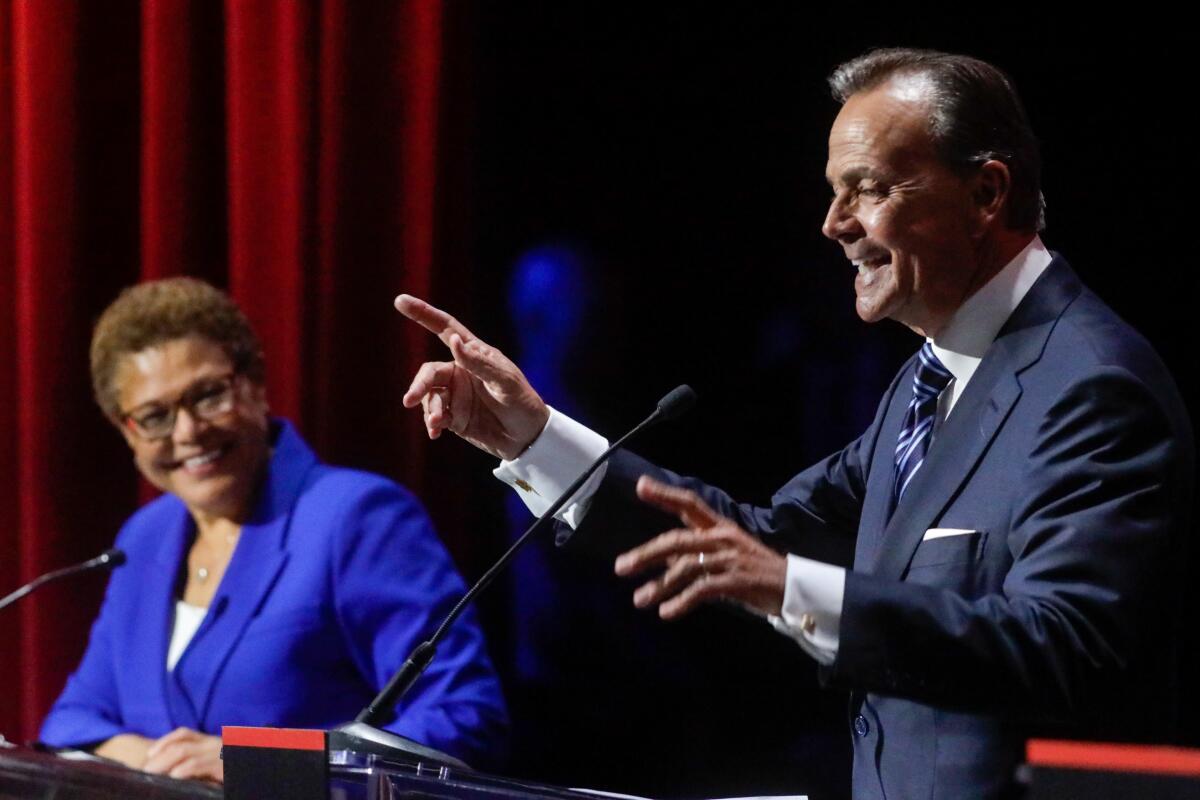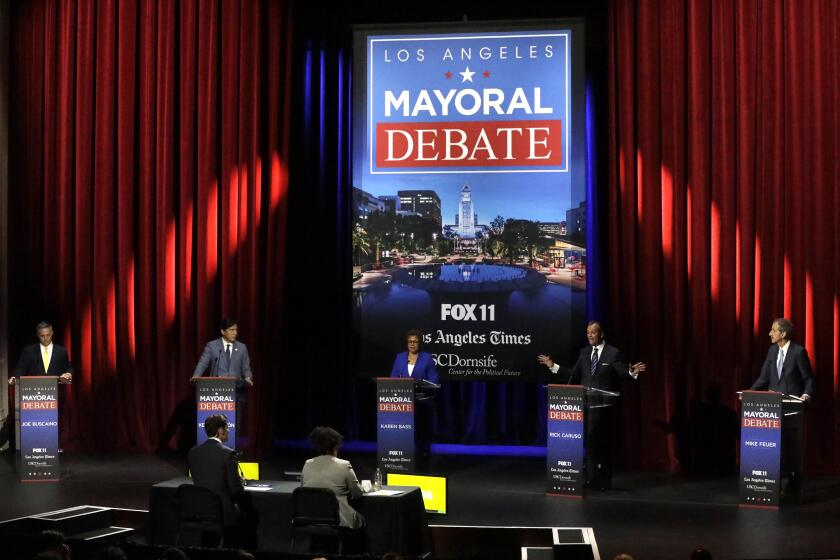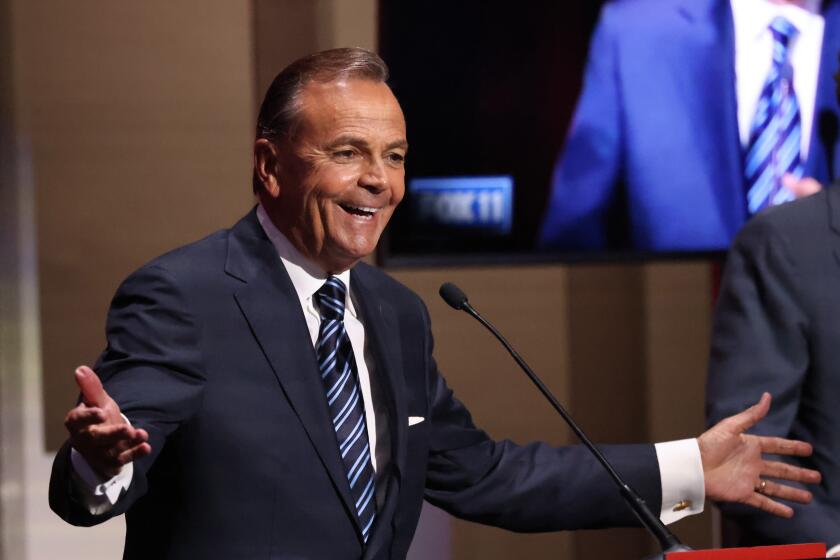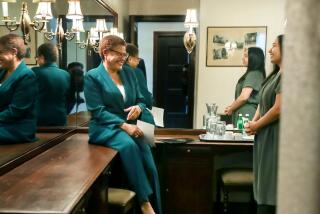How Karen Bass and Rick Caruso offer divergent paths forward for Los Angeles

- Share via
Rep. Karen Bass and businessman Rick Caruso showed up to Tuesday night’s mayoral debate with two sharply different messages — about leadership and, to an extent, the current state of the city.
Caruso cast Los Angeles as a dystopian Gotham City, one so beset by crime that every last resident is scared to walk outdoors. He cast his opponents as “career politicians” — saying the word a bit like one might handle week-old fish — and told the audience those rivals were offering “a lot of empty promises.”
Bass pushed back on that assertion, giving the real estate developer and former police commissioner a polite lecture on city government. She advised Caruso, whom she described as a friend, to stop denigrating people who have “devoted their life to public service.”
“Any of us could become mayor,” she said. “ You have to work with the City Council.”
Of the five mayoral candidates who stood onstage Tuesday at USC’s Bovard Auditorium, Caruso and Bass provided some of the most vivid contrasts.
Bass presented herself as a collaborative presence, someone who brought together people from opposing camps in Sacramento — where she served as Assembly speaker during a devastating recession — and later in Washington, D.C. She hammered on that theme Tuesday, saying the next mayor must “bring our city together” and end the tensions between city and county officials over how to help the city’s more than 40,000 unhoused residents.
For the first time on TV, top candidates were able to talk without being shouted down by hecklers. It required tight rules at USC’s Bovard Auditorium.
Caruso, for his part, has been offering a more top-down approach, selling himself as the only person capable of stepping in and taking charge of a city beset by corruption scandals, scrambling to reduce gun violence and struggling to meet the huge demand among the city’s neediest for shelter beds and affordable housing.
In recent weeks, Caruso has promised to take authority over real estate development away from the City Council — one of the most powerful tools it wields. And on Tuesday, he cited his work in the private sector as evidence that he could take on big tasks, such as a 1,500-officer expansion of the Los Angeles Police Department.
“I’m used to managing budgets. I’m an executive. I’m a manager,” Caruso said. “That’s the difference between me and other people that are running for office.”
While Caruso has emphasized the themes of crime and homelessness, Bass has voiced her own serious concerns about those issues, saying in one interview that she thinks the city is in “big trouble.” But she has sometimes placed different emphasis on what that means for the public, and for the city’s elected officials.
On the campaign trail, Bass has described the mood of the electorate as being reminiscent of the late ‘80s and early ‘90s, when residents demanded a firm response to the crack epidemic and drive-by shootings. Bass said she fears a backlash, one that will prompt the city’s leaders to embrace policies that “criminalize poverty” or “revictimize people that are already victimized.”
“I believe when the electorate gets very angry and frustrated and demoralized and cynical, then very, very bad policy decisions are made by politicians,” she said.
While Bass provided a clear contrast with Caruso, Councilman Kevin de León offered his own pointed strategy for distinguishing himself from the Brentwood businessman.
At Tuesday’s debate, he juxtaposed his own humble beginnings — he’s the son of an immigrant single mother with a third-grade education — with the affluence enjoyed by Caruso, who developed the Grove and Americana at Brand shopping malls.
De León reminded the audience that he grew up in a basement apartment, with his mother working as a housekeeper. He gave a “shoutout” to “the nannies and housekeepers working in homes on the Westside.” And he got in some digs about the developer’s business holdings.
The councilman, who represents part of the city’s Eastside, has spent much of the campaign focusing on homelessness and efforts to help those in need. At one point in the debate, when Caruso asked for five additional seconds to make a point, De León brought up his wealth again.
“You can’t let the rich break the rules here tonight,” he said.
Helen Sanchez, a media relations consultant who has worked previously on mayoral campaigns, said De León has selected a good message for his base of voters — Latinos, union members, working families. “That message isn’t just about poverty — it’s about working people, you and me,” she said.
“He’s hitting the core of the issue, which is that we have wealth disparity, we have a wide gap,” said Sanchez, who is not currently working on any mayoral campaign. “If people are listening carefully, they should want to deal with these issues.”
Caruso has framed his financial success as part of an aspirational American dream narrative, highlighting his own family’s immigrant roots and framing his business success as a major qualification for mayor. During Tuesday’s debate, he also spoke about his family’s philanthropic work in a Watts housing project, where residents have had their lives disrupted by crime and benefited from his foundation’s educational scholarships.
Still, De León was not the only candidate to zero in on Caruso’s wealth this week. City Atty. Mike Feuer repeatedly seized on that theme, bringing up Caruso’s “$100-million yacht” and demanding that he show voters his tax returns.
Caruso responded by saying he has paid his “fair share” and would release everything he has paid in taxes, including “the taxes on that boat” if all the other candidates did the same. He did not say he would release his entire return.
Feuer sought to up the ante on Wednesday, saying he had released five years’ worth of his own returns — and calling on Caruso to do the same. “L.A. voters deserve transparency from a mayor, not half-measures that raise more questions than they answer,” he said in a statement.
A Caruso spokesman said Wednesday that the developer had not changed his position.
The one candidate whose ideas were closest in line with Caruso was Councilman Joe Buscaino, who has emphasized many of the same themes for the last year, particularly on crime and homelessness. Even though he criticized Caruso much of the night, he praised the developer for his philanthropic efforts in Watts.
Column: Only Karen Bass knew Rule No. 1 in the mayoral debate: Don’t help Rick Caruso steal the show
Most candidates seemed determined to cut latecomer Rick Caruso down to size, but they wound up making him the star of this TV production.
Buscaino, who has been in office since 2012, even took some shots at longtime politicians, saying Bass, Feuer and De León “have been swapping seats left and right over the last 20 years.” (Feuer and De León have held office both in Sacramento and at City Hall; Bass has been in Congress and the state Assembly.)
Bass only gave a brief reply to that criticism, saying: “Oh, you’re joining in too?”
At key moments in the debate, Bass spoke in optimistic terms, saying during one exchange that she expects the city’s homeless encampments to be gone by the 2028 Olympics. Her overall message was “bright and sunny,” said Harvey Englander, a lobbyist and longtime political consultant who is not involved in the race.
Caruso, by comparison, has been tapping more directly into the public’s sense of concern and fear, Englander said.
“Caruso is saying ‘We’re in darkness but I’m the guy to bring you to the light,’” he said. “Honestly, that message is more compelling and in line with what people are feeling.”
Dermot Givens, a political consultant who watched Tuesday’s debate, said he too suspects that Caruso’s emphasis on fear and crime could work with voters.
“Fear sells,” he said.
Times staff writer James Rainey contributed to this report.
More to Read
Sign up for Essential California
The most important California stories and recommendations in your inbox every morning.
You may occasionally receive promotional content from the Los Angeles Times.















